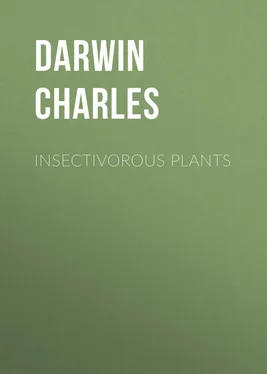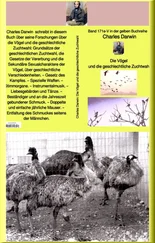Charles Darwin - Insectivorous Plants
Здесь есть возможность читать онлайн «Charles Darwin - Insectivorous Plants» — ознакомительный отрывок электронной книги совершенно бесплатно, а после прочтения отрывка купить полную версию. В некоторых случаях можно слушать аудио, скачать через торрент в формате fb2 и присутствует краткое содержание. Жанр: foreign_antique, foreign_prose, на английском языке. Описание произведения, (предисловие) а так же отзывы посетителей доступны на портале библиотеки ЛибКат.
- Название:Insectivorous Plants
- Автор:
- Жанр:
- Год:неизвестен
- ISBN:нет данных
- Рейтинг книги:5 / 5. Голосов: 1
-
Избранное:Добавить в избранное
- Отзывы:
-
Ваша оценка:
- 100
- 1
- 2
- 3
- 4
- 5
Insectivorous Plants: краткое содержание, описание и аннотация
Предлагаем к чтению аннотацию, описание, краткое содержание или предисловие (зависит от того, что написал сам автор книги «Insectivorous Plants»). Если вы не нашли необходимую информацию о книге — напишите в комментариях, мы постараемся отыскать её.
Insectivorous Plants — читать онлайн ознакомительный отрывок
Ниже представлен текст книги, разбитый по страницам. Система сохранения места последней прочитанной страницы, позволяет с удобством читать онлайн бесплатно книгу «Insectivorous Plants», без необходимости каждый раз заново искать на чём Вы остановились. Поставьте закладку, и сможете в любой момент перейти на страницу, на которой закончили чтение.
Интервал:
Закладка:
I made a vast number of trials by placing, by means of a fine needle moistened with distilled water, and with the aid of a lens, particles of various substances on the viscid secretion surrounding the glands of the outer tentacles. I experimented on both the oval and long-headed glands. When a particle is thus placed on a single gland, the movement of the tentacle is particularly well seen in contrast with the stationary condition of the surrounding tentacles. (See previous fig. 6.) In four cases small particles of raw meat caused the tentacles to be greatly inflected in between 5 and 6 m. Another tentacle similarly treated, and observed with special care, distinctly, though slightly, changed its position in 10 s. (seconds); and this is the quickest movement seen by me. In 2 m. 30 s. it had moved through an angle of about 45o. The movement as seen through a lens resembled that of the hand of a large clock. In 5 m. it had moved through 90o, and when I looked again after 10 m., the particle had reached the centre of the leaf; so that the whole movement was completed in less than 17 m. 30 s. In the course of some hours this minute bit of meat, from having been brought into contact with some of the glands of the central disc, acted centrifugally on the outer tentacles, which all became closely inflected. Fragments of flies were placed on the glands of four of the outer tentacles, extended in the same plane with that of the blade, and three of these fragments were carried in 35 m. through an angle of 180o to the centre. The fragment on the fourth tentacle was very minute, and it was not carried to the centre until 3 hrs. had elapsed. In three other cases minute flies or portions of larger ones were carried to the centre in 1 hr. 30 s. In these seven cases, the fragments or small flies, which had been carried by a single tentacle to the central glands, were well embraced by the other tentacles after an interval of from 4 to 10 hrs.
I also placed in the manner just described six small balls of writing-paper (rolled up by the aid of pincers, so that they were not touched by my fingers) on the glands of six exterior tentacles on distinct leaves; three of these were carried to the centre in about 1 hr., and the other three in rather more than 4 hrs.; but after 24 hrs. only two of the six balls were well embraced by the other tentacles. It is possible that the secretion may have dissolved a trace of glue or animalised matter from the balls of paper. Four particles of coal-cinder were then placed on the glands of four exterior tentacles; one of these reached the centre in 3 hrs. 40 m.; the second in 9 hrs.; the third within 24 hrs., but had moved only part of the way in 9 hrs.; whilst the fourth moved only a very short distance in 24 hrs., and never moved any farther. Of the above three bits of cinder which were ultimately carried to the centre, one alone was well embraced by many of the other tentacles. We here see clearly that such bodies as particles of cinder or little balls of paper, after being carried by the tentacles to the central glands, act very differently from fragments of flies, in causing the movement of the surrounding tentacles.
I made, without carefully recording the times of movement, many similar trials with other substances, such as splinters of white and blue glass, particles of cork, minute bits of gold-leaf, &c.; and the proportional number of cases varied much in which the tentacles reached the centre, or moved only slightly, or not at all. One evening, particles of glass and cork, rather larger than those usually employed, were placed on about a dozen glands, and next morning, after 13 hrs., every single tentacle had carried its little load to the centre; but the unusually large size of the particles will account for this result. In another case 6/7 of the particles of cinder, glass, and thread, placed on separate glands, were carried towards, or actually to, the centre; in another case 7/9, in another 7/12, and in the last case only 7/26 were thus carried inwards, the small proportion being here due, at least in part, to the leaves being rather old and inactive. Occasionally a gland, with its light load, could be seen through a strong lens to move an extremely short distance and then stop; this was especially apt to occur when excessively minute particles, much less than those of which the measurements will be immediately given, were placed on glands; so that we here have nearly the limit of any action.
I was so much surprised at the smallness of the particles which caused the tentacles to become greatly inflected that it seemed worth while carefully to ascertain how minute a particle would plainly act. Accordingly measured lengths of a narrow strip of blotting paper, of fine cotton-thread, and of a woman's hair, were carefully weighed for me by Mr. Trenham Reeks, in an excellent balance, in the laboratory in Jermyn Street. Short bits of the paper, thread, and hair were then cut off and measured by a micrometer, so that their weights could be easily calculated. The bits were placed on the viscid secretion surrounding the glands of the exterior tentacles, with the precautions already stated, and I am certain that the gland itself was never touched; nor indeed would a single touch have produced any effect. A bit of the blotting-paper, weighing 1/465 of a grain, was placed so as to rest on three glands together, and all three tentacles slowly curved inwards; each gland, therefore, supposing the weight to be distributed equally, could have been pressed on by only 1/1395 of a grain, or .0464 of a milligramme. Five nearly equal bits of cotton-thread were tried, and all acted. The shortest of these was 1/50 of an inch in length, and weighed 1/8197 of a grain. The tentacle in this case was considerably inflected in 1 hr. 30 m., and the bit of thread was carried to the centre of the leaf in 1 hr. 40 m. Again, two particles of the thinner end of a woman's hair, one of these being 18/1000 of an inch in length, and weighing 1/35714 of a grain, the other 19/1000 of an inch in length, and weighing of course a little more, were placed on two glands on opposite sides of the same leaf, and these two tentacles were inflected halfway towards the centre in 1 hr. 10 m.; all the many other tentacles round the same leaf remaining motionless. The appearance of this one leaf showed in an unequivocal manner that these minute particles sufficed to cause the tentacles to bend. Altogether, ten such particles of hair were placed on ten glands on several leaves, and seven of them caused the tentacles to move in a conspicuous manner. The smallest particle which was tried, and which acted plainly, was only 8/1000 of an inch (.203 millimetre) in length, and weighed the 1/78740 of a grain, or .000822 milligramme. In these several cases, not only was the inflection of the tentacles conspicuous, but the purple fluid within their cells became aggregated into little masses of protoplasm, in the manner to be described in the next chapter; and the aggregation was so plain that I could, by this clue alone, have readily picked out under the microscope all the tentacles which had carried their light loads towards the centre, from the hundreds of other tentacles on the same leaves which had not thus acted.
My surprise was greatly excited, not only by the minuteness of the particles which caused movement, but how they could possibly act on the glands; for it must be remembered that they were laid with the greatest care on the convex surface of the secretion. At first I thought – but, as I now know, erroneously – that particles of such low specific gravity as those of cork, thread, and paper, would never come into contact with the surfaces of the glands. The particles cannot act simply by their weight being added to that of the secretion, for small drops of water, many times heavier than the particles, were repeatedly added, and never produced any effect. Nor does the disturbance of the secretion produce any effect, for long threads were drawn out by a needle, and affixed to some adjoining object, and thus left for hours; but the tentacles remained motionless.
Читать дальшеИнтервал:
Закладка:
Похожие книги на «Insectivorous Plants»
Представляем Вашему вниманию похожие книги на «Insectivorous Plants» списком для выбора. Мы отобрали схожую по названию и смыслу литературу в надежде предоставить читателям больше вариантов отыскать новые, интересные, ещё непрочитанные произведения.
Обсуждение, отзывы о книге «Insectivorous Plants» и просто собственные мнения читателей. Оставьте ваши комментарии, напишите, что Вы думаете о произведении, его смысле или главных героях. Укажите что конкретно понравилось, а что нет, и почему Вы так считаете.












